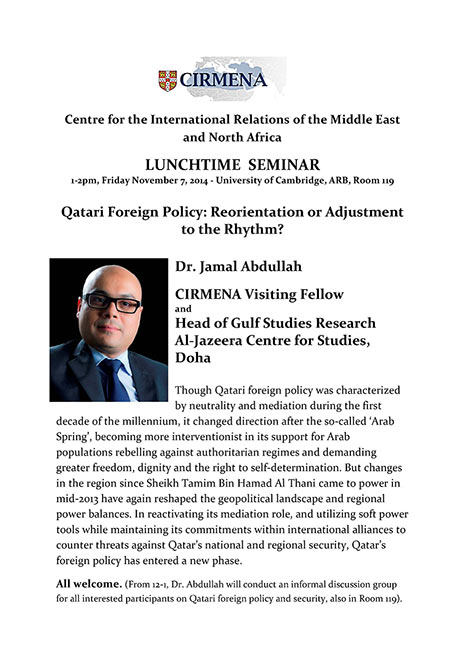To understand events in the Middle East and North Africa as they rapidly unfold with widespread regional and international implications, nuanced analysis is of critical importance. To this end CIRMENA is hosting a series of occasional seminars that will provide scholarly insight and assessment based on local knowledge and long-time expertise.
CIRMENA Visiting Fellow Dr. Jamal Abdullah Head of Gulf Studies Research at al-Jazeera Centre for Studies in Doha on 'Qatari Foreign Policy: Reorientation or Adjustment to the Rhythm?'
Abstract Qatar’s foreign policy has undergone shifts in reaction to regional geopolitical developments. Though Qatari foreign policy was characterized by neutrality and mediation during the first decade of this millennium; it changed direction after the so-called ‘Arab Spring’ began, becoming more interventionist by showing support for Arab populations who were rebelling against authoritarian regimes and demanding greater freedom, dignity and the right to self-determination. But changes in the region since Sheikh Tamim Bin Hamad Al Thani came to power in mid-2013 have once again reshaped the geopolitical landscape and regional power balances. These include the ousting of Egyptian President-elect Mohamed Morsi, the escalating tensions and conflicts in Libya, the expansion of the Islamic State (ISIL) in the region and its seizure of large areas in both Syria and Iraq, the Al-Houthi control of major state departments in Yemen, and the recent Israeli offensive on the Gaza Strip. All of these events have impacted Qatari foreign policy as it deals with ongoing developments at the regional and international levels. In reactivating its mediation role, at which Doha excelled during the first decade of the millennium, and utilizing soft power tools while also maintaining its commitments within international alliances to counter threats against Qatar’s national security and regional security, Qatar’s foreign policy has entered a new phase of wielding ‘smart power’, as characterized by Jospeh Nye.
Bio: Dr. Jamal Abdullah is Researcher and Head of the Gulf Studies Unit at Al Jazeera Center for Studies in Doha. He holds a Ph.D in International Relations Law from Avignon University in France, and Masters degree in International Relations and Diplomacy from Jean Moulin University in France. He obtained two Master degrees from Lumière University, France; one in Political Sociology and another in Political Science. He is the author of “Qatar’s Foreign Policy 1995 – 2013: Leverages and Strategies” published in May 2014. Dr. Abdullah has been a Visiting Fellow at the University of Cambridge, since September 2014, and a Visiting Lecturer at the NATO Defense College in Rome since September 2012.


